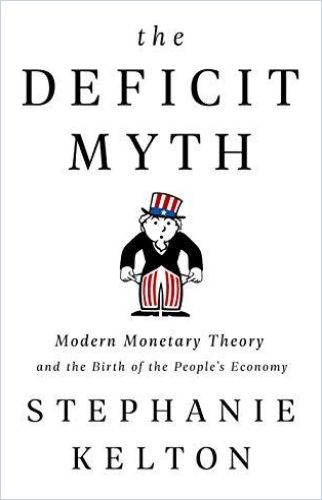“But how will you pay for it?” is a common refrain in American politics, but what if cost really is no object? In The Deficit Myth, economist Stephanie Kelton explains why America can have its debt without fret.

Pay No Attention to the Debt Behind the Curtain
Stephanie Kelton, a professor at Stony Brook University and former economist on the US Senate Budget Committee, has gained notoriety with her claim that deficits don’t matter. In The Deficit Myth, she argues that federal governments need not balance their budgets; if they spend beyond their means, central banks can simply print more money. It’s an appealing theory, and Kelton makes a compelling case for it.
Foreign Affairs said the book was “clear and vigorously written,” and The Guardian wrote of Kelton, “She has succeeded in instigating a round of heretical questioning, essential for a post-COVID-19 world, where the pantheon of economic gods will have to be reconfigured.” Economic adviser Mohamed A. El-Erian called The Deficit Myth “a ‘must-read’ that is sure to influence many aspects of policy making going forward.” But the text also has drawn plenty of detractors, including The Wall Street Journal, which termed it “magical thinking,” and the Cato Institute, which wrote that “it’s an attractive vision, but it doesn’t work.”
Modern Monetary Theory
According to Kelton, it’s a political trope that federal governments should budget as working families do and spend no more than they earn. This sounds intuitively correct, she notes, but it ignores the critical distinction between families and the state: The federal government can print its own money. This ability is the cornerstone of modern monetary theory (MMT), which holds that deficits are irrelevant and that balancing any public budget is pointless. Kelton says that even those politicians who embrace the wisdom of MMT are afraid to publicly espouse the theory for fear of ridicule.
Preaching the virtues of fiscal restraint is always a safe play. Challenging these articles of faith is heretical.Stephanie Kelton
The author writes that, if a nation gives up its monetary sovereignty, it loses the ability to control its financial destiny. This happened to Greece and Italy, which fell into crisis after abandoning their national currencies for the euro. Kelton notes that imposed fiscal austerity and other traditional measures only worsened their downward spiral. Such misguided moves generally flow from the notion that federal governments must source any funds that they spend on the public good. Kelton highlights that the United States achieved monetary sovereignty in 1971 when President Richard Nixon ended the policy of making dollars convertible into gold; now the federal government can create money.
Inflation Is the Problem, Not Debt
Kelton argues that the real problem isn’t spending too much; it’s inflation – or, in recent years, a lack thereof. Experts’ understanding of inflation remains murky, and the author points to economist Milton Friedman’s theory of a “natural rate of unemployment”: Fall below it and inflation takes hold. But Kelton highlights that no one knows the level of inflation-inducing unemployment, and it might not even exist. Proponents of MMT assert that central banks have been mismanaging inflation at the cost of “perpetual unemployment” for millions.
With a fiat currency, it’s impossible for Uncle Sam to run out of money.Stephanie Kelton
Kelton says that the national debt is meaningless, and that there’s no chance the United States will wind up broke, like Greece. There’s also no need to fret about China shutting down the US economy, she comments: America gets China’s money on favorable terms and pays no interest on the greenbacks that China keeps stashed in its account at the Federal Reserve.
Spending Limits Are Illusory
Free trade has decimated manufacturing jobs, Kelton admits, but the way to return America’s lost jobs is not through tariffs but through a strategy of full employment via government spending. Kelton also discusses Social Security, Medicare and Medicaid, which have long been the subjects of dire projections, but the reality is far more benign, she claims: The federal government can create as much money as it wants to support these programs. It is not a financial problem, the author posits, but a political one.
The federal government currently spends about $4.5 trillion a year, but Kelton says that there’s nothing special about that number. Congress could boost the budget to $5 trillion or $6 trillion to spend on schools, health care, roads or job guarantees – Kelton offers a brief survey of real-world experiments with positive outcomes. As progressives often point out, the conventional wisdom that government programs must pay for themselves never quite extends to military budgets or to tax breaks. Somehow, Kelton notes, there’s always money for these programs, thanks to their effect on politicians’ re-electability.
The deficit myth has warped our understanding of all government spending.Stephanie Kelton
Kelton concedes that advocates of MMT don’t believe in unlimited spending. The economy does not have boundless productive capacity. Per Kelton, MMT simply proposes swapping out artificial financial budget limitations with constraints that more closely reflect biological, material and inflationary realities.
The Jury Is Still Out
Kelton’s book has been well-received, with some economists calling it a “triumph.” Still, Kelton doesn’t discuss the deeper theoretical underpinnings of MMT, which makes the book accessible to lay readers but can come across as a weakness – as can spending too long explaining why climate change and wealth inequality matter rather than how MMT will improve those issues. In this sense, Kelton plays into the critique of economist Thomas Palley, who says that MMT is nothing more than a “policy polemic for depressed times.” Some readers may be reluctant to embrace MMT because it could give politicians license to spend without grappling with power-limiting consequences, such as the unpopular high taxes that go toward increased spending.
Readers who want to delve further into the historical forebears of MMT should read the work of John Maynard Keynes, such as The General Theory of Employment, Interest and Money. Current-day works include Mariana Mazzucato’s The Value of Everything: Making and Taking in the Global Economy and L. Randall Wray’s Modern Money Theory: A Primer on Macroeconomics for Sovereign Monetary Systems.






